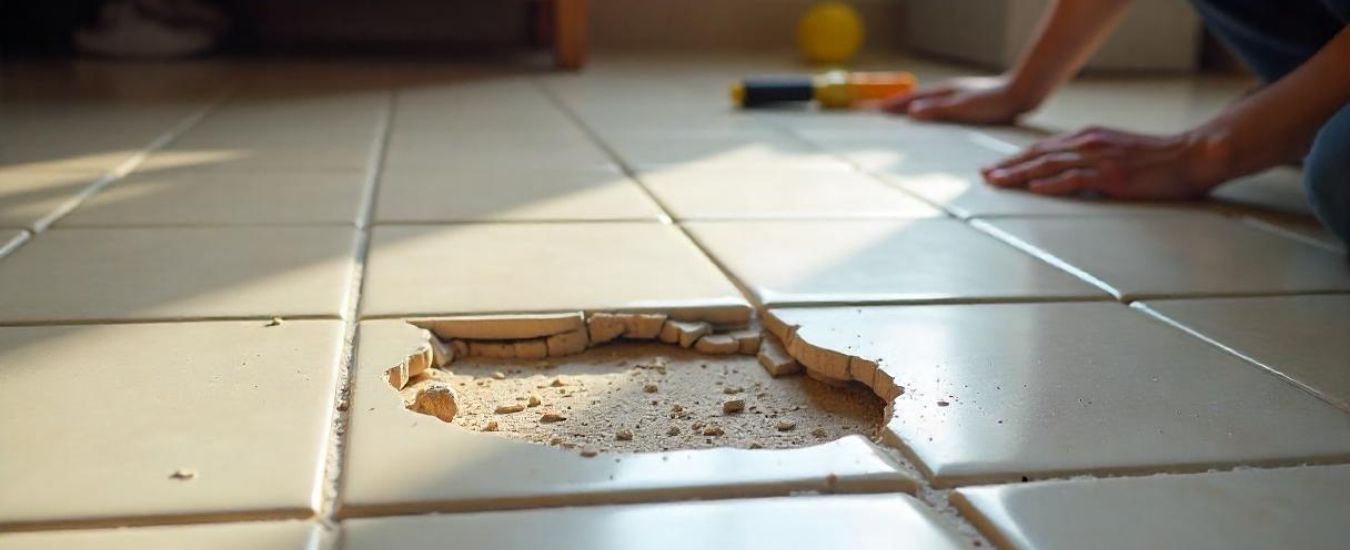Tile popping is one of those household problems that comes out of nowhere — one day, everything’s fine, and the next, you hear a loud “POP” and find a tile raised or cracked. Sounds familiar?
Tile popping might seem like a minor nuisance, but if left unchecked, it can cause long-term Damage to your flooring and substructure. Whether it’s due to moisture, thermal expansion, or structural movement, understanding the root cause is key to fixing it for good.
So next time you hear a suspicious “POP” — don’t ignore it. Investigate, repair, and most importantly — install smart, prevent smarter.
Let’s break down everything you need to know about tile popping, including the causes, fixes, and, most importantly, how to prevent it.
What Is Tile Popping?
Tile popping refers to the phenomenon where tiles detach and lift from the surface they’re installed on. This could be due to thermal expansion, poor adhesive, moisture, or structural issues.
It can affect both ceramic and porcelain tiles and is often accompanied by a cracking sound, raised tiles, or broken grout.
Common Signs of Tile Popping
- Audible popping or cracking sounds
- Raised or lifted tiles
- Loose or hollow sounds when tapped
- Cracked grout lines or gaps
If you’re noticing any of these signs, don’t ignore them — they’re early warnings of bigger problems.
Top Causes of Tile Popping
1. Thermal Expansion
Tiles naturally expand and contract with temperature changes. In hot climates or sun-exposed floors, this pressure can cause them to lift or crack if there’s no room to expand.
2. Poor Adhesive Bonding
If the tile adhesive used is of poor quality or was applied unevenly, the bond won’t last long — leading to detachment over time.
3. Moisture Infiltration
Water trapped under the tile can weaken the adhesive and cause swelling of the subfloor, pushing the tile upward.
4. Substrate Movement
If the concrete subfloor shifts due to settlement or cracks, tiles may no longer stay firmly in place.
5. Improper Surface Preparation
Installing tiles on a dusty, oily, or uneven surface prevents proper bonding.
6. No Space for Expansion
Grout joints that are too narrow don’t allow for tile movement, resulting in buckling.
7. Structural Vibrations
High-rise apartments, metros nearby, or seismic zones can transfer vibrations that gradually loosen tiles.
Consequences of Ignoring Tile Popping
- Injury Risk from uneven flooring
- Further Damage to nearby tiles
- Water seepage issues
- Costly Repairs, if not addressed early
How to Fix Popped Tiles?
DIY Repair (If Limited to One or Two Tiles)
- Remove the damaged tile carefully with a chisel.
- Clean the subfloor and remove old adhesive.
- Apply new tile adhesive evenly.
- Set the new tile and align it properly.
- Re-grout and seal after 24 hours.
When to Call a Pro
- If multiple tiles are affected
- If there’s subfloor damage
- If popping is recurring
How to Prevent Tile Popping?
Use the Right Adhesive
Choose a flexible, high-quality adhesive that can absorb stress and movement.
Prepare the Subfloor Properly
Ensure the surface is clean, level, and dry before laying the tiles.
Leave Enough Space Between Tiles
Grout joints allow for expansion and contraction — don’t skip this step!
Install Expansion Joints
Especially useful in large floor areas or outdoor tiling.
Control Indoor Temperature
Use blinds or shades to limit direct sun exposure and maintain indoor humidity.
Avoid Impact Vibrations
Don’t hammer or drill around tiled areas unnecessarily.
Tile Popping in Different Spaces
In Homes
Common in kitchens, balconies, and bathrooms
Caused by poor ventilation or trapped moisture
In Offices & Malls
Heavy foot traffic and AC-related temperature shifts
Title
Susceptible to weathering and rainwater seepage
Materials That Help Prevent Tile Popping
- Epoxy-based adhesives (better grip)
- Flexible grouts
- Anti-fracture membranes (prevent subfloor cracks from affecting tiles)
Expert Advice
- Always perform a hollow sound check after installation
- Use tile spacers to maintain even grout gaps
- Don’t skip curing time for adhesive and grout
FAQs
What causes tiles to pop up suddenly?
Tiles pop up due to trapped moisture, thermal expansion, or weak adhesive bonding.
Can I fix popped tiles myself?
Yes, if it’s just 1–2 tiles and the subfloor is intact. For larger issues, call a pro.
Are popped tiles a sign of structural Damage?
Sometimes. If popping is widespread or recurring, it could indicate subfloor or structural issues.
How do I stop my tiles from lifting?
Use proper adhesive, leave grout gaps, and prepare the surface well before installation.
Which tiles are best to prevent popping?
Porcelain tiles with epoxy adhesive and flexible grout perform best in most conditions.

